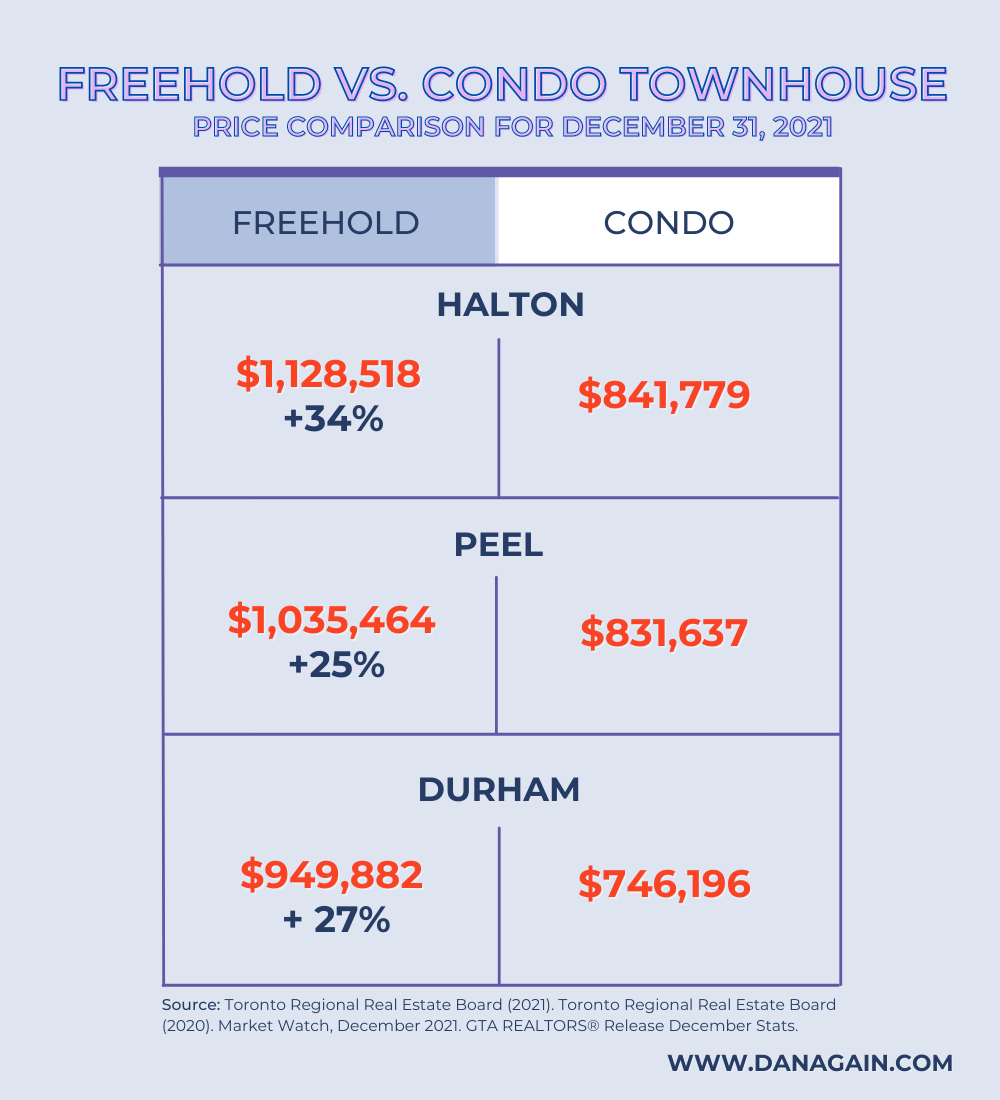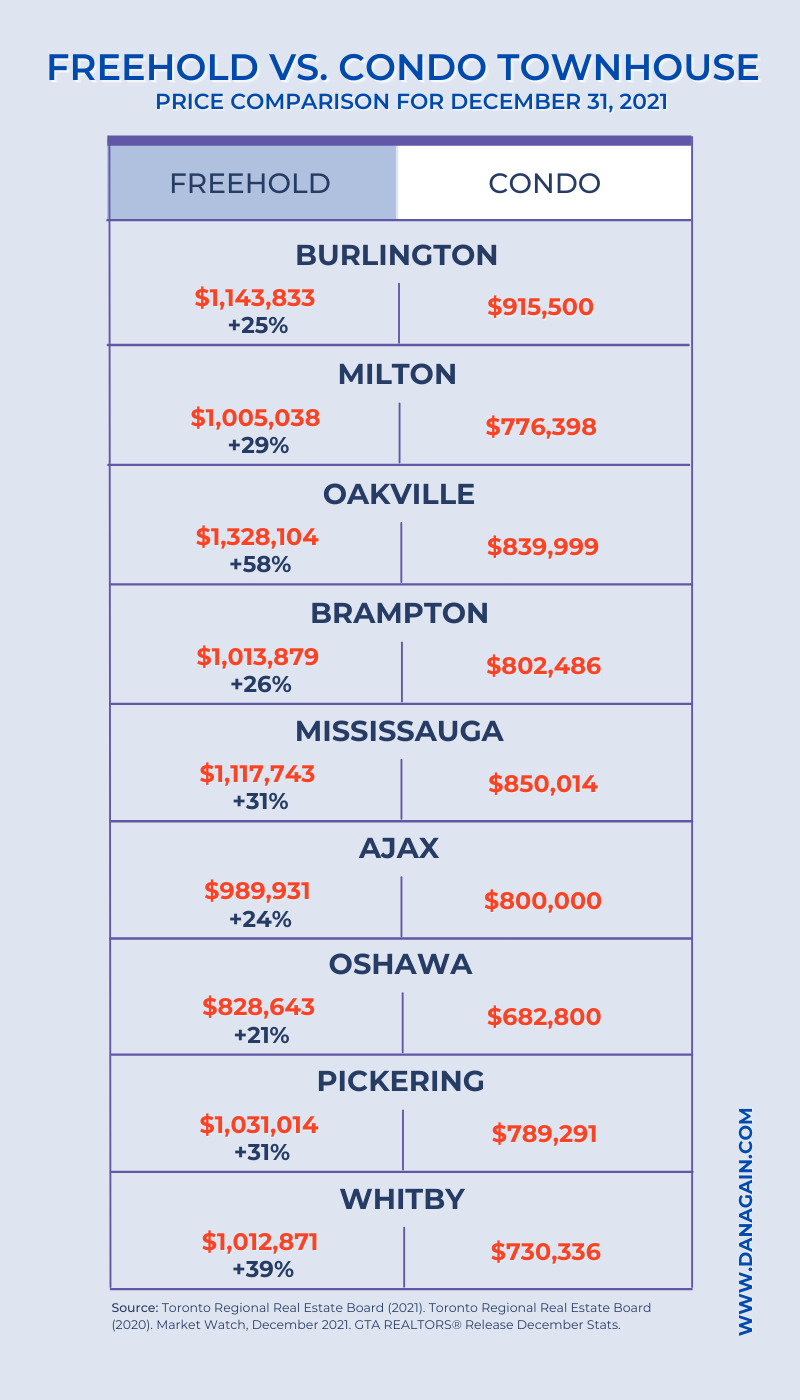Ask us the number of times we hear from clients that they don’t want to pay condo fees, and we will tell you: every day.
But as they say, there’s no such thing as a free lunch. Freehold townhomes are more expensive than condo towns, and not by a small amount. There is a substantial price difference between these two types of townhouse ownership.
Let’s look at the price difference you can expect between the two, what you own when you buy a townhouse, and what the implications may be for renovations.
The Price Difference
While the price difference between freehold and condo townhomes is indeed sizeable, it does vary by municipality and by city and of course will change depending on market conditions.
Looking at three municipalities, we see evidence of these ranges.

In Halton region, a freehold townhouse sold for $1,128,518 on average during the month of December, 2021. A condo townhouse in the same region sold for just $841,779. Thus, in Halton the premium a buyer would pay to own a freehold townhouse was $285,739, an additional 34%.
Peel and Durham regions saw similar price variations between the ownership types.
In Peel region, the average price of a freehold townhouse in December 2021 was $1,035,464 while condo townhomes came in at a rather more affordable $831,637. Here the price difference between the ownership options was smaller than Halton region at just 25%, but still represents a significant price difference. A buyer would have paid $203,827 more in Peel region to avoid condo fees.

Similarly, average prices in Durham region between freehold and condo towns during December 2021 ranged from $949,882 for freehold to $746,196 for condo towns, a 27% price difference. Durham pricing in December was certainly more attractive than Halton or Peel, however still required buyers to pay a $203,686 premium for freehold.
Suddenly those condo fees don’t look so bad.
Here are the differences by specific city across the GTA:

What Do You Own?
When you buy a townhouse, there are a few different styles. The usual 2-storey variety, the newer 3-storey type, and the nifty stacked townhouse option. There are also other variations we have seen including the less common bungalow townhouse.
In addition to different configurations, there are distinct ownership options for townhomes. These include:
Freehold Townhouse
Here you own the land and the structure in its entirety. No condo fees or homeowner association fees are typically associated with this ownership style.

In most aspects the freehold town is identical to owning a detached property in terms of the ownership, except that you share two walls with another owner, one on either side. The notable exception is in the case of the end unit where you share only one wall between you.
Condominium Townhouse
In this shared ownership type, homeowners pay monthly condo or maintenance fees to a condo corporation. This fee normally includes a portion to a reserve fund, which is designed to cover major replacements or repairs like shared roofing or roads.
Also included in the fee is an amount for building insurance, and care and maintenance of the common areas including things like pools, hallways, and elevators.

There may be other inclusions as well, depending on the condo corporation setup, such as repair of windows or garage doors. Detail about what’s included in the condo townhouse you are considering can be found in the status certificate documents provided by your REALTOR®.
Common Element Condominium (CEC) Townhouse
This is a combination of the first and second ownership type. This form of ownership is freehold in that the building and land are freehold; fully owned by you like the freehold townhouse scenario. The condominium component covers only shared areas such as roads, parks, golf courses, or ski hills.

The condo fee in this example is usually very low, often less than $100/month, because it only needs to cover a short list of items to maintain, most commonly a road.
Renovation Implications
With a freehold townhouse, it’s likely that no approvals would be necessary for a renovation (beyond what might be required from the local municipality). If you wanted to add a fence or shed in the backyard, for example, there is no condo corporation to seek approvals from in advance. This is because you own the land.

One exception to this is the common element condominium ownership style. Here, the condo corporation that dictates the rules for the shared roads or park may also set limitations on what can be renovated and how. The idea is to maintain a certain uniformity in the neighbourhood. For example, you may need to check ahead before changing the colour of a front door or painting the exterior.
In a condo townhouse, by contrast, it would be important to verify required approvals in the condo corporation rules beforehand. Approvals are necessary at the condo corporation level before approaching a municipality for small or large renovations such as adding or changing fencing, or for any other household projects.

If you are considering renovating a condo townhouse, a good rule of thumb is always to check the rules first to see what needs approval and what does not. It is important to start out on the right foot because if approval is needed and not obtained, you may have to change everything back to its original state later – and at your own expense.
Reference: Toronto Regional Real Estate Board (2020). Market Watch, December 2021. GTA REALTORS® Release December Stats.

Subscribe to Monthly Newsletter
Explore More Articles
Daily Listings to Your Inbox
What's Your Home Worth?

